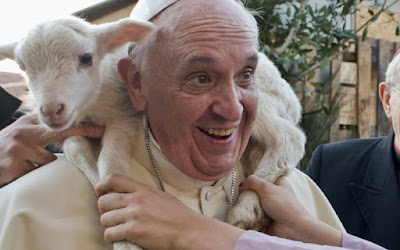THE HUMBLE FLOCK OF THE BRAVE SHEPHERD.
May 03 2020: Fourth Sunday of Easter – A.
A Russian proverb says, “The wolf can always be hired very
cheap as a shepherd.” Another Latin proverb adds, “It is the part of a good
shepherd to shear his flock, not to skin it.”
“The Lord is my shepherd; there is nothing I shall want.”
Here is the beautiful response of the Psalm that gives meaning and color to our
today’s Eucharistic celebration. He who has the Lord by his side wants for
nothing; for, he already has everything. ‘Christ alone suffices,’ could we say,
paraphrasing St. Teresa of Avila.
The Easter season is the best time for us, Christians, not
only to strengthen our belonging to the Risen Lord, but also to recognize and
affirm that he is our all, and that in him and through him, we have all things.
For, “He made us, we belong to him, we are his people, the flock he shepherds”
(Ps 100:3). Though we are humble, weak and broken by sin, he, the strong one is
our shepherd.
We are today the fourth Sunday of Easter, well known as “the
Good Shepherd Sunday”, a day of prayer for vocations. All the readings, or to
be honest, almost all, except the first reading, speak of shepherd and sheep.
In the Gospel, Jesus defines himself not as a shepherd, but
as the gate that leads to the sheepfold. It is a solemn affirmation of who he
is. By saying so, the Lord emphasizes on the need to pass through him, to
belong to him. He says, “whoever does not enter a sheepfold through the gate
but climbs over elsewhere is a thief and a robber.” As Christians, that must
sound like a stern warning for us. Do we belong to Christ or are we just like
some thieves, a special breed of brigands bearing falsely the Christian name?
The Lord goes farther to stretch on the relationship between
sheep and shepherd. This could be a special address to us, leaders of the flock
of Christ, we, pastors and churchmen and women. The Lord says that the sheep
hear the voice of the shepherd, that is, they know his voice and they follow
him. They follow not a stranger or a brigand. Instead, “they will run away from
him because they do not recognize the voice of strangers.” We, leaders, do our
sheep know us? Do they recognize our voice? Do they willingly and happily
follow us?
Pope Francis, on this matter, has a beautiful expression,
speaking of the relationship that must exist between pastors and sheep. He says
that we Church leaders should be “shepherds living with the smell of the
sheep”. A leader, a shepherd who refuses to smell like his sheep is a thief, a
brigand, a usurper of title.
Unfortunately, to say it honestly, many of us, Church
leaders and pastors are not where we are supposed to be. Many have lost their
vocation or chosen others’ vocation. Many priests, evangelists, pastors, and
prophets are more businessmen than shepherds. They know their sheep only for
their personal and egoistic interests. Some pastors fatten themselves with the
fat of their sheep. And because the sheep know them, they are afraid to listen
to them and therefore do not follow them. Some sheep prefer getting lost than
to follow a mercenary.
As pastors, we need to pay great attention to what the
people say about us, how do they judge us. What our parishioners and the
faithful say of us are not always only words of gossip, but what they perceive
of us. Therefore, we will recognize which category of shepherds we are if we
listen carefully to them. Are we good shepherds or brigands?
In the second reading, taking the same image of shepherd and
sheep, Peter, in his pastoral letter exhorts us to be Christ’s imitators. That
is, to be able to bear patiently punishment when we go through trials.
Moreover, we need a firm relationship with Christ through whom we are saved.
For, if before we were lost, away from God because of our sins, now in Christ,
we have been brought back to righteousness. That is actually what does the
“Good Shepherd”. He searches for the strayed one and brings him back into the
flock.
The first reading can teach us the way to come back to the
Lord our shepherd and into the sheepfold. This is found in the answer Peter
gives to the people who ask, “What are we to do, my brothers?” What must we do
to be back to Christ? Peter answers, “Repent… for the forgiveness of your sins;
and you will receive the gift of the Holy Spirit.”
Easter is the time for you and me to come back to the Lord
our shepherd. It is the time to repent, to change our evil ways and embrace
righteousness. These words, this call to repentance apply to sheep as well as
to the shepherd, and even more so to the shepherds that we are. God's call to
you and me is a call to holiness. Let us respond with courage to this common
vocation.
In these times of pandemic due to the Chinese Virus, God's
people need pastors, not the least, but good pastors. Let us all, each
according to his possibilities, be shepherds for our brothers and sisters,
starting in our families, as fathers and mothers, parents and children. Let us
cultivate concern for each other as Christ cares about us and has laid down his
life for us. He is our archetypal; may we imitate him.





Comments
Post a Comment